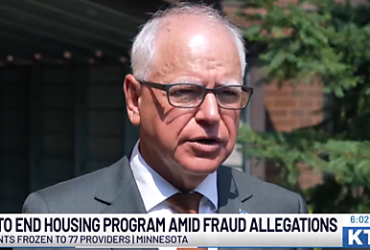Matthew Cavedon
President Donald Trump yesterday called for progressive billionaire George Soros and his son, Alexander, to be charged under RICO (the federal Racketeer Influenced and Corrupt Organizations Act). Their supposed crime? “Their support of Violent Protests, and much more, all throughout the United States of America.”
The call to prosecute may be bluster. As politicians on both sides of the aisle have learned in recent years, it’s much easier to tweet accusations than secure indictments and convictions. But the president’s threat reflects a larger problem that is already well underway: the abuse of broad, vague criminal laws to attack the freedom of association.
Two years ago, Georgia prosecutors used a state version of RICO to charge 61 people associated with protests against the Atlanta Public Safety Training Center (better known as “Cop City”). The indictment blasted “anarchists” 57 times. While some of the charges were serious, including throwing Molotov cocktails at police buildings, other defendants were accused of acts like sending in $40 “for radio communication devices and camp fuel.” Prosecutors charged all of these people as part of one grand conspiracy.
Certain criminal laws give governments an easy way to attack entire movements they dislike. RICOs are one kind. Others include laws against conspiracies, street gang activity, and terrorism. Of course, organized crime, gang violence, and terrorism are menaces to society that governments should combat. But overbroad criminal laws all too easily become dragnets. A person who sets off a bomb and someone who buys groceries for other members of the same group are not moral equivalents.
The best defense against these laws is the Constitution, and one of its most important safeguards is the First Amendment freedom of association. Interpreting that right, the Supreme Court has held that governments cannot adopt the theory of guilt by association. People can be prosecuted for a group’s illegal activity only if they know about and agree with it. Merely carrying radical literature is not enough. Nor is advocating revolutionary ideas in the abstract. Freedom needs breathing room, and if anyone can be made to carry water for their associates’ every act, there is no such thing as freedom of speech or thought.
Many years ago, Justice Hugo Black warned against the “hysteria” that “tars with the same brush all those who have ever been associated with any member of the group under attack.” President Trump just tarred the Soroses as violent rioters for the unspecified acts of others with whom they may have the remotest of associations. Hopefully, American justice will still prove rich enough to turn back this RICO abuse—and cut back on the laws that threaten our freedom of association.






